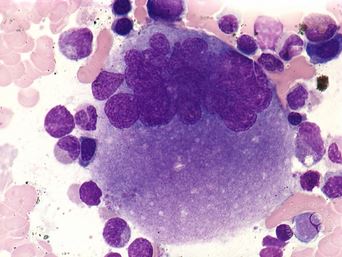Megakaryocytes are fascinating and essential cells in our bodies that play a crucial role in producing blood platelets. Despite their importance, they often don’t receive much attention outside specialized medical fields. In this article, we’ll explore what megakaryocytes are, their functions, and their significance in health and disease, all in an easy-to-understand way.
What Are Megakaryocytes?
Megakaryocytes are large, specialized cells found in the bone marrow, the soft tissue inside your bones where blood cells are produced. The name “megakaryocyte” comes from Greek, where “mega” means large and “karyon” means nucleus. True to their name, megakaryocytes are notable for their size and their unique role in the production of platelets.
These cells are responsible for creating platelets, which are tiny, disc-shaped cells crucial for blood clotting. Without megakaryocytes, our bodies wouldn’t be able to produce platelets, leading to severe bleeding and other health issues.
How Do Megakaryocytes Produce Platelets?
The process of platelet production, known as thrombopoiesis, is quite remarkable. Here’s a simplified breakdown:
- Development: Megakaryocytes originate from hematopoietic stem cells in the bone marrow. These stem cells differentiate into megakaryocytes through a series of stages, each one more specialized than the last.
- Growth: As megakaryocytes mature, they become extremely large and their nuclei undergo a process called endomitosis. This is where the nucleus divides without the cell itself dividing, resulting in a cell with multiple nuclei. This allows the megakaryocyte to produce more platelets.
- Platelet Release: Once mature, megakaryocytes extend long, branching projections called proplatelets into the blood vessels of the bone marrow. These proplatelets break up into thousands of small, disc-shaped platelets that enter the bloodstream.
- Circulation: The platelets then travel through the blood and are ready to perform their critical role in clotting, which helps to stop bleeding when blood vessels are injured.
Why Are Megakaryocytes Important?
Megakaryocytes are essential for several reasons:
- Blood Clotting: Platelets produced by megakaryocytes are crucial for blood clotting. When a blood vessel is injured, platelets quickly move to the site, sticking to the wound and forming a clot to stop the bleeding. Without enough platelets, even minor injuries can lead to excessive bleeding.
- Wound Healing: By contributing to blood clot formation, platelets also play a role in the overall healing process. They release growth factors that help in tissue repair and wound healing.
- Immune Function: Platelets have roles beyond clotting. They interact with white blood cells and contribute to the immune response, helping to defend the body against infections and other threats.

Disorders Related to Megakaryocytes
Problems with megakaryocytes can lead to various blood disorders. Some of these include:
- Thrombocytopenia: This condition is characterized by a low platelet count, which can result from decreased production by megakaryocytes or increased destruction of platelets. Causes can range from bone marrow disorders to autoimmune diseases.
- Thrombocythemia: In this condition, the body produces too many platelets. It can occur due to a disorder of the megakaryocytes or as a secondary response to another disease. High platelet levels can increase the risk of blood clots and other complications.
- Leukemia: Certain types of leukemia, such as acute megakaryoblastic leukemia, involve abnormal growth of megakaryocyte precursors. This can disrupt normal blood cell production and lead to various health issues.
Research and Advances in Megakaryocyte Studies
Research into megakaryocytes and platelet production is ongoing, with several exciting areas of exploration:
- Stem Cell Therapy: Scientists are studying how to use stem cells to generate megakaryocytes and platelets in the lab. This could offer new treatments for patients with blood disorders related to platelet production.
- Genetic Studies: Understanding the genetic factors that affect megakaryocyte function could lead to better diagnostic tools and therapies for related diseases.
- Drug Development: New drugs targeting megakaryocytes and platelet production are being developed to treat disorders like thrombocytopenia and thrombocythemia more effectively.
How to Support Healthy Megakaryocytes
While megakaryocyte health is largely controlled by internal processes and genetics, maintaining overall good health can support normal blood cell production. Here are a few general tips:
- Balanced Diet: Eating a diet rich in vitamins and minerals supports overall blood health. For example, iron, vitamin B12, and folic acid are essential for healthy blood cell production.
- Regular Exercise: Physical activity promotes good circulation and overall cardiovascular health, which can support optimal blood cell function.
- Regular Check-ups: Routine medical check-ups can help detect any underlying issues with blood cell production early on, allowing for timely intervention.
Megakaryocytes might not be the most talked-about cells in the body, but their role in producing platelets is crucial for maintaining health and preventing excessive bleeding. Understanding how these cells function and the disorders associated with them helps us appreciate the complexity of blood production and the ongoing research aimed at improving treatments for blood-related conditions.
